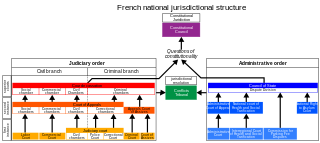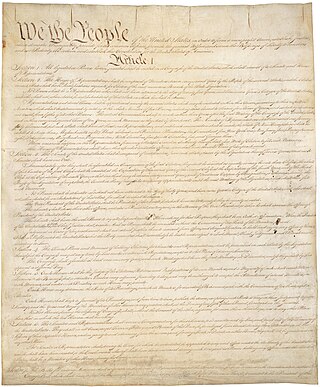Related Research Articles

In law, common law is the body of law created by judges and similar quasi-judicial tribunals by virtue of being stated in written opinions.

Constitutional law is a body of law which defines the role, powers, and structure of different entities within a state, namely, the executive, the parliament or legislature, and the judiciary; as well as the basic rights of citizens and, in federal countries such as the United States and Canada, the relationship between the central government and state, provincial, or territorial governments.
Precedent is a principle or rule established in a legal case that becomes authoritative to a court or other tribunal when deciding subsequent cases with similar legal issues or facts. The legal doctrine stating that courts should follow precedent is called stare decisis.

The Fourth Amendment to the United States Constitution is part of the Bill of Rights. It prohibits unreasonable searches and seizures and sets requirements for issuing warrants: warrants must be issued by a judge or magistrate, justified by probable cause, supported by oath or affirmation, and must particularly describe the place to be searched and the persons or things to be seized.

The law of the Republic of Ireland consists of constitutional, statutory, and common law. The highest law in the State is the Constitution of Ireland, from which all other law derives its authority. The Republic has a common-law legal system with a written constitution that provides for a parliamentary democracy based on the British parliamentary system, albeit with a popularly elected president, a separation of powers, a developed system of constitutional rights and judicial review of primary legislation.
Civil liberties in the United States are certain unalienable rights retained by citizens of the United States under the Constitution of the United States, as interpreted and clarified by the Supreme Court of the United States and lower federal courts. Civil liberties are simply defined as individual legal and constitutional protections from entities more powerful than an individual, for example, parts of the government, other individuals, or corporations. The explicitly defined liberties make up the Bill of Rights, including freedom of speech, the right to bear arms, and the right to privacy. There are also many liberties of people not defined in the Constitution, as stated in the Ninth Amendment: The enumeration in the Constitution, of certain rights, shall not be construed to deny or disparage others retained by the people.
The right to privacy is an element of various legal traditions that intends to restrain governmental and private actions that threaten the privacy of individuals. Over 150 national constitutions mention the right to privacy. On 10 December 1948, the United Nations General Assembly adopted the Universal Declaration of Human Rights (UDHR), originally written to guarantee individual rights of everyone everywhere; while right to privacy does not appear in the document, many interpret this through Article 12, which states: "No one shall be subjected to arbitrary interference with his privacy, family, home or correspondence, nor to attacks upon his honour and reputation. Everyone has the right to the protection of the law against such interference or attacks."
Cohen v. California, 403 U.S. 15 (1971), was a landmark decision of the US Supreme Court holding that the First Amendment prevented the conviction of Paul Robert Cohen for the crime of disturbing the peace by wearing a jacket displaying "Fuck the Draft" in the public corridors of a California courthouse.

Privacy laws of the United States deal with several different legal concepts. One is the invasion of privacy, a tort based in common law allowing an aggrieved party to bring a lawsuit against an individual who unlawfully intrudes into their private affairs, discloses their private information, publicizes them in a false light, or appropriates their name for personal gain.
A social enterprise is an organization that applies commercial strategies to maximize improvements in financial, social and environmental well-being. This may include maximizing social impact alongside profits for co-owners.
AEI Legal Center for the Public Interest (LCPI) was formed when the National Legal Center for the Public Interest (NLCPI) was merged into the conservative think tank American Enterprise Institute (AEI) in September 2007. Its stated mission is to "foster knowledge about law and the administration of justice, especially with respect to individual rights, free enterprise, property ownership, limited government, and a fair and efficient judiciary. It has pursued its educational and intellectual missions through a publishing program, conferences, and the annual Gauer Distinguished Lecture in Law and Public Policy."

The Fundamental Rights, Directive Principles of State Policy and Fundamental Duties' are sections of the Constitution of India that prescribe the fundamental obligations of the states to its citizens and the duties and the rights of the citizens to the State. These sections are considered vital elements of the constitution, which was developed between 1949 by the Constituent Assembly of India.

The Delaware Supreme Court is the sole appellate court in the United States state of Delaware. Because Delaware is a popular haven for corporations, the Court has developed a worldwide reputation as a respected source of corporate law decisions, particularly in the area of mergers and acquisitions.

French law has a dual jurisdictional system comprising private law, also known as judicial law, and public law.
The Directive Principles of State Policy of India are the guidelines to be followed by the government of India for the governance of the country. They are not enforceable by any court, but the principles laid down there are considered 'Fundamental' in the governance of the country, which makes it the duty of the State to apply these principles in making laws to establish a just society in the country. The principles have been inspired by the Directive Principles given in the Constitution of Ireland which are related to socialjustice, economic welfare, foreign policy, and legal and administrative matters.
United States v. Kagama, 118 U.S. 375 (1886), was a landmark United States Supreme Court case that upheld the constitutionality of the Major Crimes Act of 1885. This Congressional act gave the federal courts jurisdiction in certain Indian-on-Indian crimes, even if they were committed on an Indian reservation. Kagama, a Yurok Native American (Indian) accused of murder, was selected as a test case by the Department of Justice to test the constitutionality of the Act.
The legal system of Azerbaijan is based on civil law. As the country was a republic of the Soviet Union until 1991, its legal history has also been influenced heavily by socialist law. However, after the collapse of the Soviet Union, Azerbaijan became independent by enactment of the constitutional act of national independence on 18 October 1991. Azerbaijan adopted a Constitution in 1995 which is the foundation of the legislative system of the modern country.
The Buckeye Institute is a 501(c)(3) conservative, free-market public policy think tank. The organization, based in Columbus, Ohio, says its mission is "to advance free-market public policy in the states."

The law of the United States comprises many levels of codified and uncodified forms of law, of which the most important is the nation's Constitution, which prescribes the foundation of the federal government of the United States, as well as various civil liberties. The Constitution sets out the boundaries of federal law, which consists of Acts of Congress, treaties ratified by the Senate, regulations promulgated by the executive branch, and case law originating from the federal judiciary. The United States Code is the official compilation and codification of general and permanent federal statutory law.
United States v. Alfonso D. Lopez, Jr., 514 U.S. 549 (1995), was a landmark case of the United States Supreme Court that struck down the Gun-Free School Zones Act of 1990 (GFSZA) due to its being outside of Congress's power to regulate interstate commerce. It was the first case since 1937 in which the Court held that Congress had exceeded its power under the Commerce Clause.
References
- ↑ Sheri Qualters (2012). "Panelists debate impact of 'Citizens United' in recent election". nlj.com. Retrieved December 20, 2012.
- 1 2 3 NELF. "nelfonline.org". Archived from the original on May 30, 2012. Retrieved March 28, 2012.
- ↑ Commonwealth of Massachusetts (1996). "New England Legal Foundation vs. City of Boston". masscases.com. Retrieved March 28, 2013.